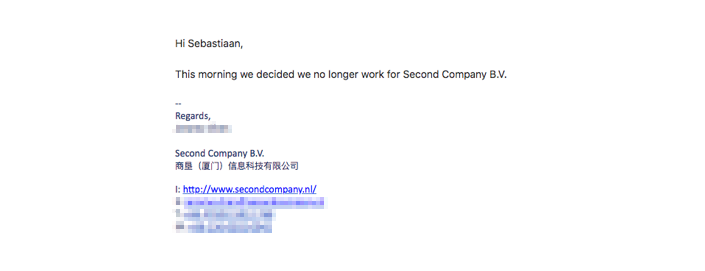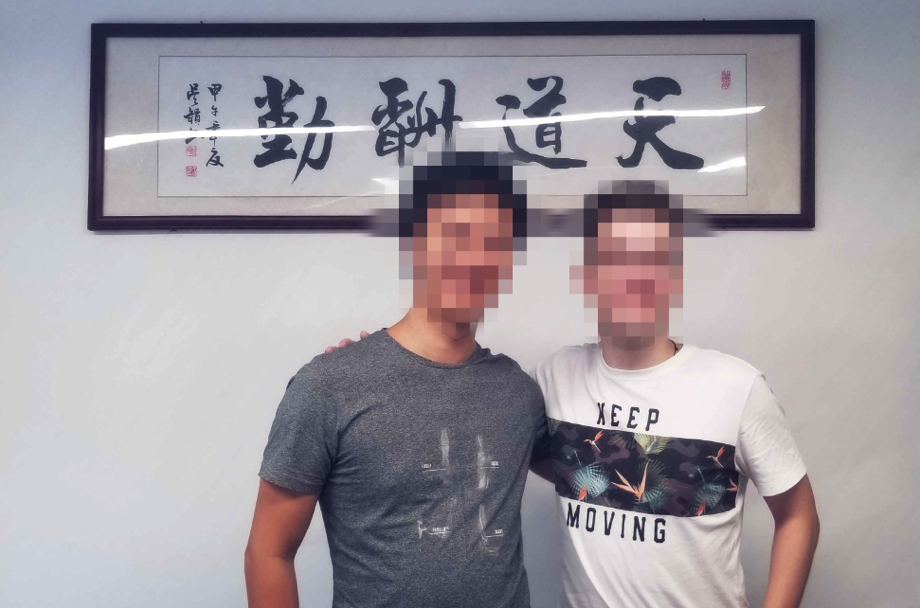Your office has been robbed and your partner has embezzled €100,000. What do you do?
Five painful lessons from ten years of doing business in China.

China, the promised land for IT entrepreneurs. There are opportunities on every street corner and you will not find better software developers anywhere else. But China is also a tough country. It is every man for himself and money rules. In this blog I hope to share the lessons that I have learned during my ten years in China. These are lessons about trust, risks, crisis management, leadership, and more.
In 2011, I started Second Company Limited, registered in Xiamen, China. The goal: to use high-quality but affordable Chinese developers for Dutch customers and gradually recruit Chinese customers. My Chinese business partner and Dutch operational manager, both trained by me, were in charge of the day-to-day operation of the team. They worked on the ground in China, I supervised from the Netherlands. My investment: €100,000. My confidence in our cooperation at the time: 100,000%
Lesson 1: Do not appoint a legal representative
For a long time, we kept in touch with each other on a daily basis. Pleasant, relaxed, friendly. The projects ran smoothly, things went well, not a cloud in sight. Then, on Monday morning of February 26, I received this email.

Wait, what?
After the initial shock, my first reaction was, “we shall see about that!” I boarded a plane to China that very day. Not only to confront my “partners”, but also to have a conversation with them. I knew that if I were to play hardball immediately, we would never get anywhere.
When I arrived at the office in Xiamen, I could not believe my eyes. The space was emptied. Blank. That place, where only days prior stood brand new iMac computers, desks, chairs, and table plants (all paid for by me), was now completely empty save for some loose cords. It was as if I had ended up in a spy movie.
Alright, so “having a conversation” might have been too optimistic. I called my lawyer in China from the empty office. He was totally shocked by the sudden move, but he immediately pointed out my crucial mistake… My Chinese business partner had recommended that I make him a legal representative of Second Company Limited, and so I had. “You’ll need it, that’s how things work here in China,” he had said. Because of my confidence in him, I had given him a mandate that gave him far-reaching authority over the company and property. I could just kick myself.

“We could go to the police,” my lawyer said, “but that will cost you €15,000 and there is a chance that they will simply rule it as a business dispute. The legal procedure could take over a year and even though you are likely to win, can you wait a year?”
I could not. I had ongoing projects for Dutch clients that were completely carried out in China. These had to continue! An additional issue was that the quotations I had given to these customers were based on the lower costs for development in China. This meant that I could not simply set up an expensive Dutch developer without operating at a loss.
I was feeling nauseous. It seemed as if the ground was sinking under my feet. I, my company, my employees, and even my family was about to be dragged into the abyss. What should I do, what could I do?!
Lesson 2: You are only powerless if you think you are
Being powerless sucks. It is the worst feeling in the world. However, you are rarely completely powerless. I immediately made a choice: my customers in the Netherlands are the most importance. Without them, everything ends. Therefore my priority was to set up a process in which they would only be minimally impacted by the situation. As soon as I made that choice, the feeling of powerlessness stopped. It gave me a direction and a goal.
I had been in touch with a developer in Kazakhstan before, also a country with countless talented developers. He could take over certain jobs right away, but at a slightly higher rate. A few weeks later, most projects seemed saved. Thank God that most customers kept their faith in me.
Lesson 3: Be as transparent as possible and always offer a solution
Only in moments of crisis will you really get to know your customers. One took up the challenge with us and even offered an advance on a €100,000 order. The other sent a notice of default. You never know. I built Second Company on the basis of transparency and trust, especially towards my customers. That said, for each separate stakeholder you still have to make a consideration about what you should tell them and what you should not. If they trust you, trust them back by being transparent. And always offer a solution, because a “bad news conversation” is less of a deal breaker when you can tell your customer how you are going to solve the issue. In our case, development from Kazakhstan.
Lesson 4: Leadership exists and it is incredibly valuable
I do not want to pat myself on the back, because I’ve certainly made my share of mistakes in this story. However, in this tough situation, I succeeded in keeping my customers and employees on board and also in delivering quality. My job was to stay calm, think rationally, and offer ideas for a quick solution. That’s how I learned that leadership is all about trust. It’s not about outward display or comforting words. No, it’s all about proving that you are worthy of the trust of others and that you want to fight for them every day. If you continue to prove this, they will continue to follow you.
Lesson 5: Don’t forget who you are
I have certainly learned my lesson. My company in China no longer exists and my investment is in someone else’s hands. So be it. My original mission to work with top international talent has succeeded and the company is doing better than ever. We have strengthened our Dutch presence with highly skilled migrants from Kazakhstan, just not from China. Fortunately, I never had to accept that advance and now Second Company is more profitable and growing faster than ever with a branch in Kazakhstan and even a small branch in China.
Want to know more about how we rebuild our company? Read: How the Chinese secret service affected my IT company in Haarlem.
Do you have a question about this topic?
Software development by Second Company
Techniques
Second Company specializes in developing, managing and hosting tailor-made software integration solutions. We are also specialized in applying the latest techniques and methods within software development.
More information
















